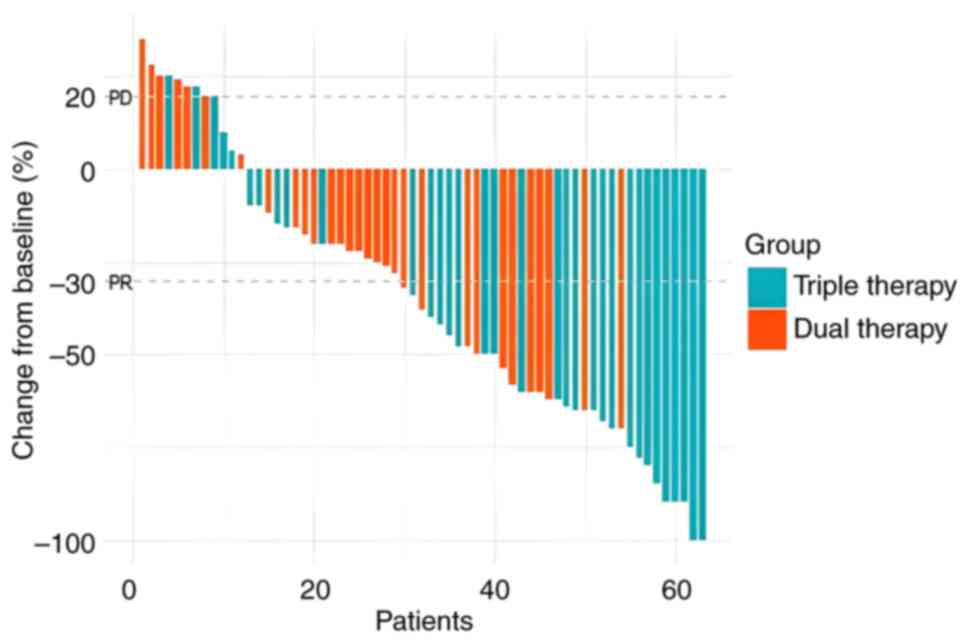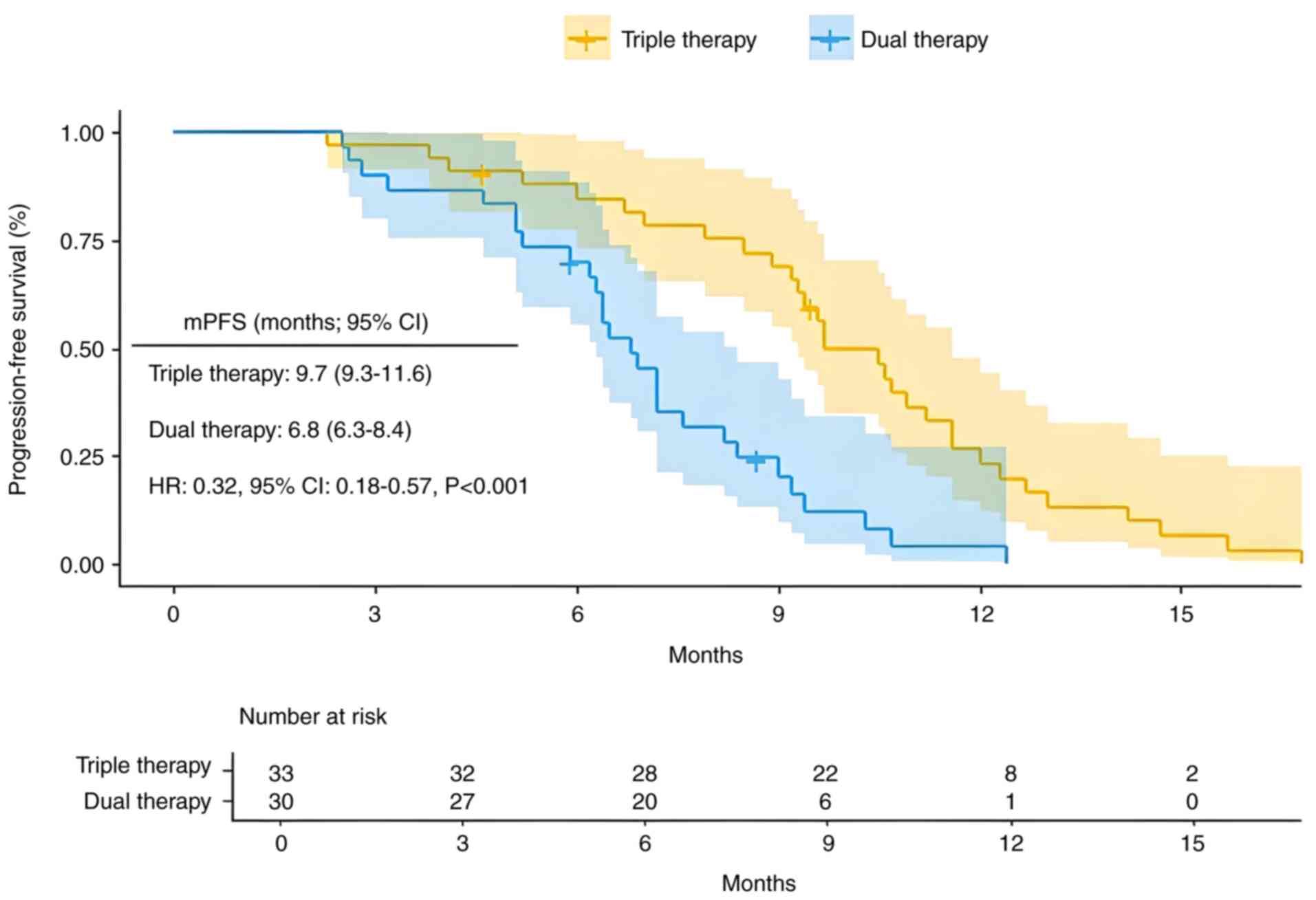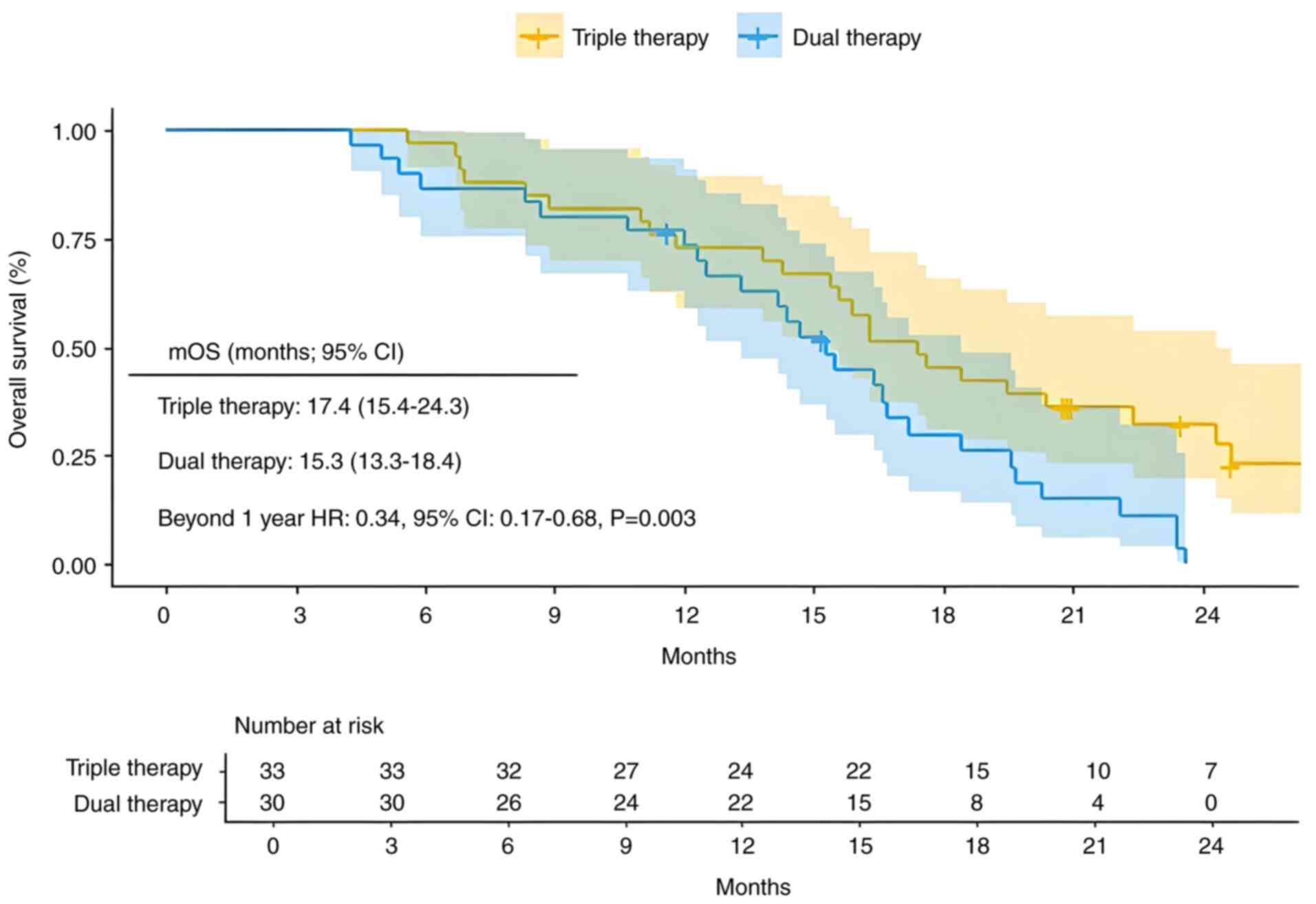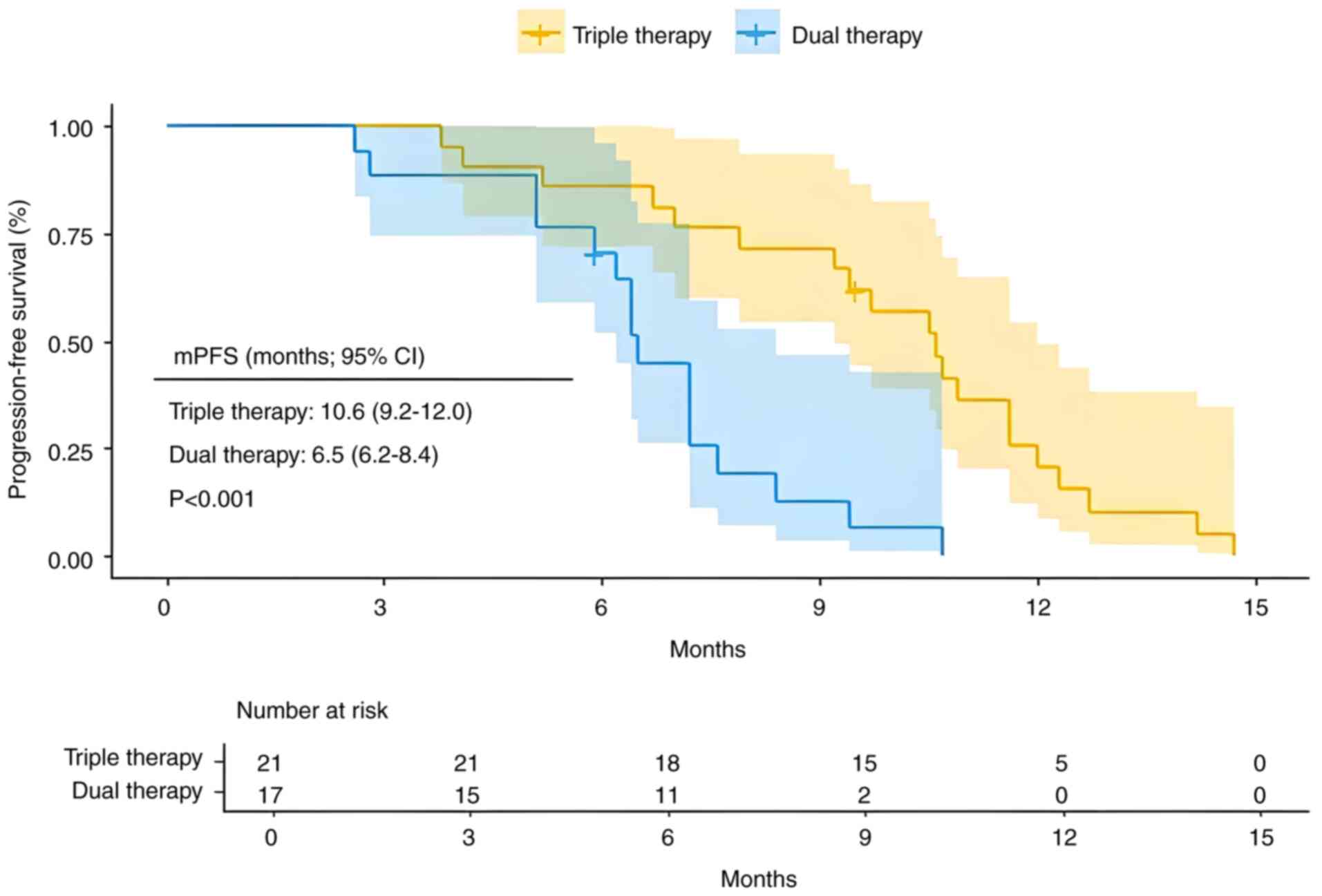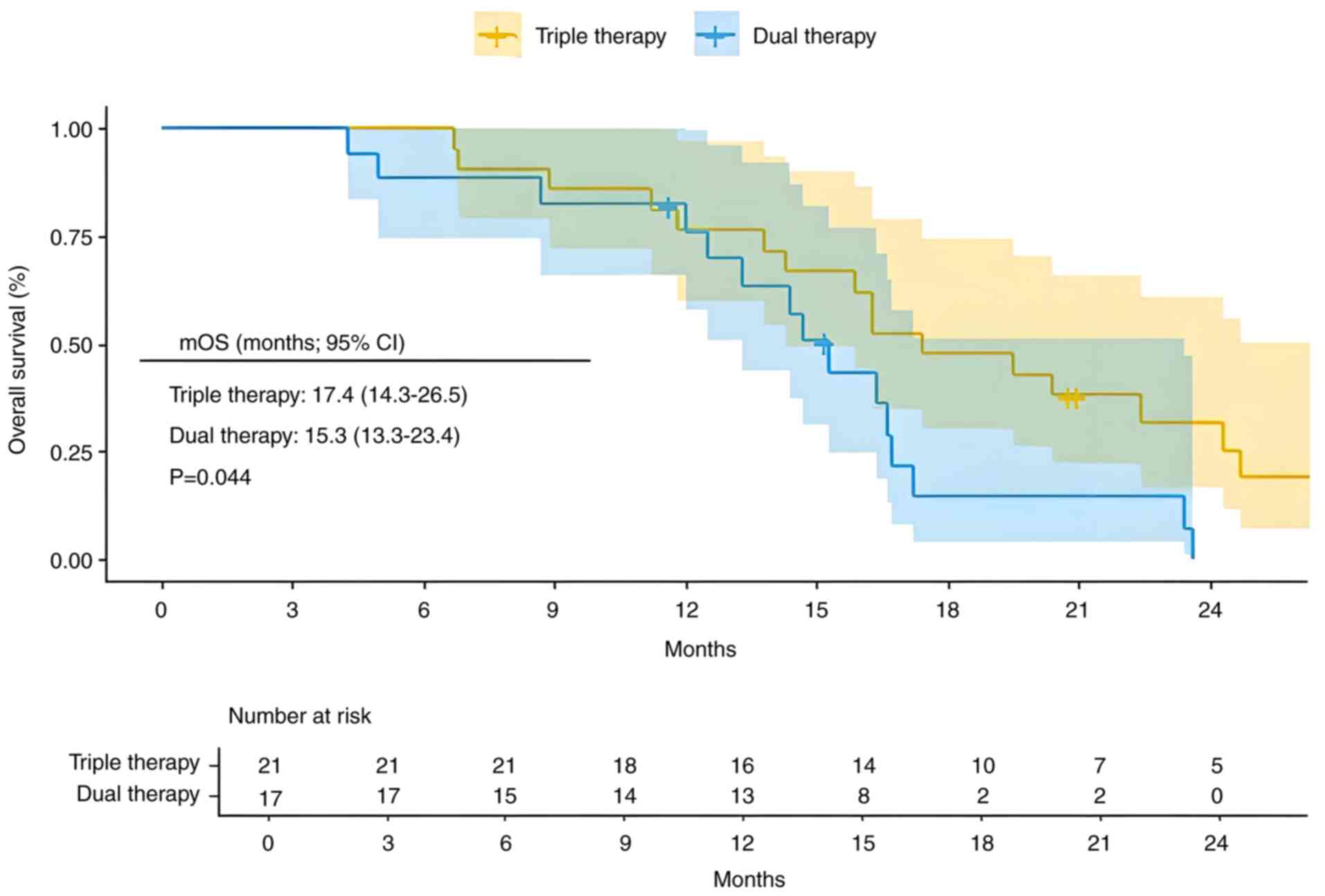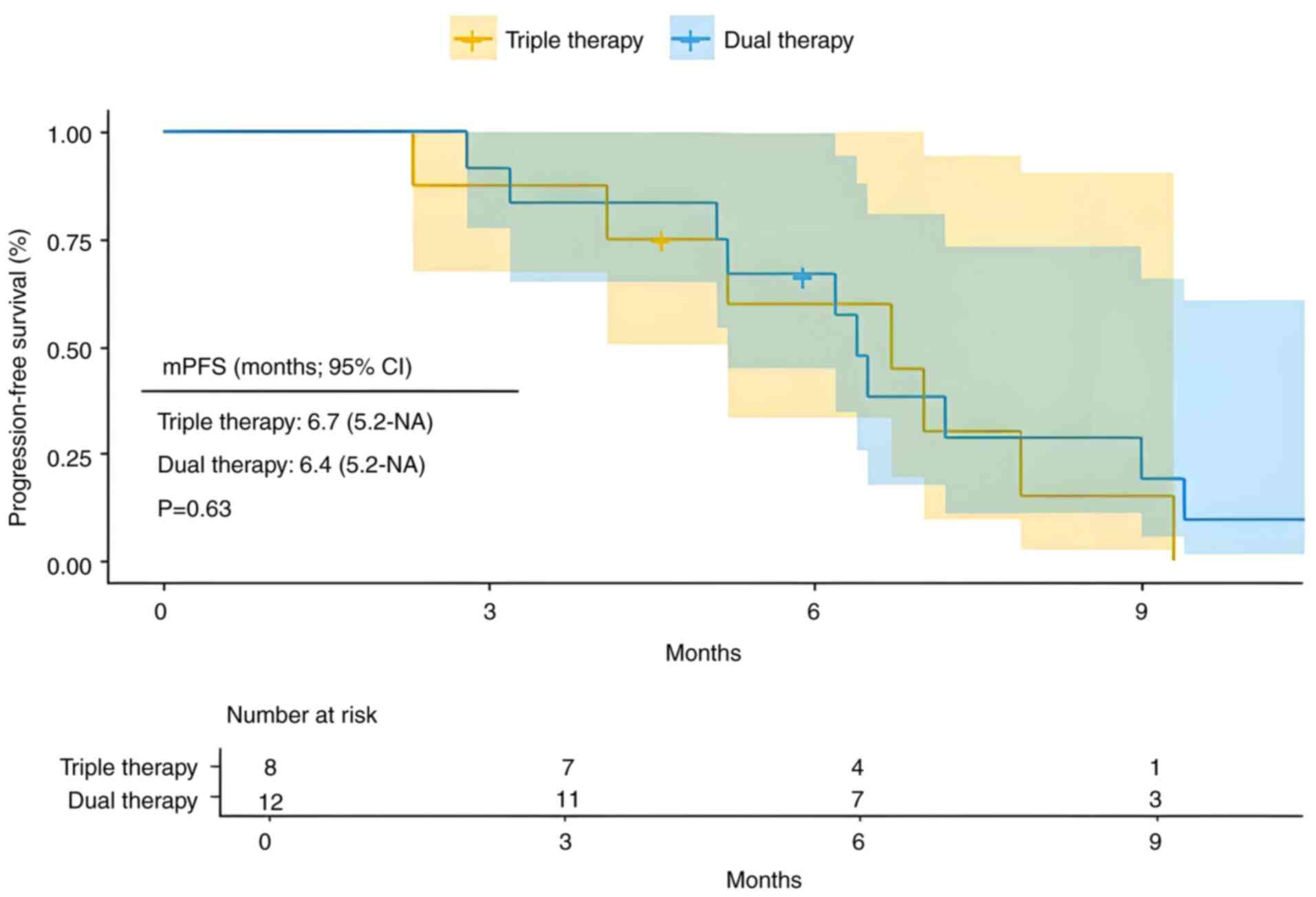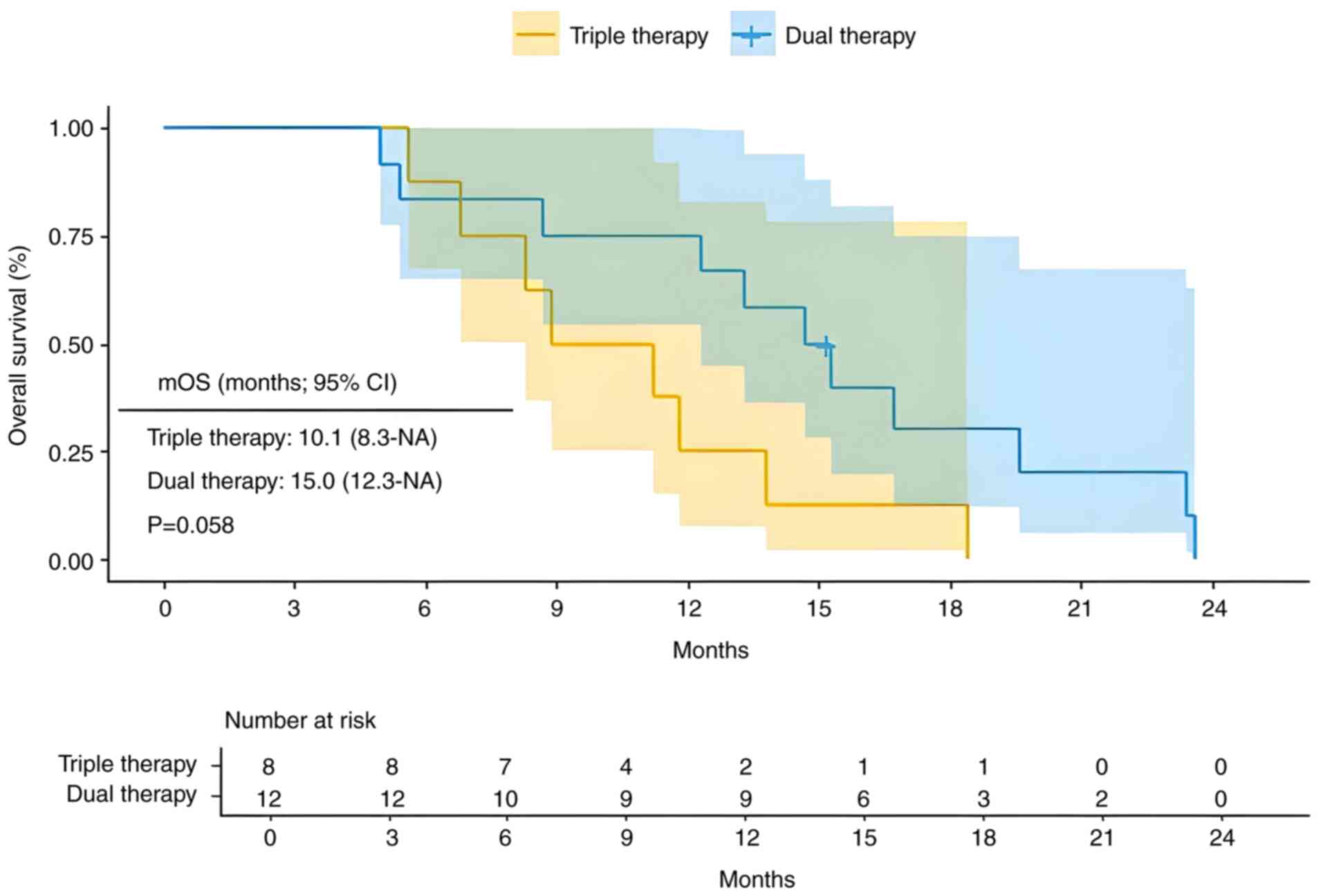|
1
|
Bray F, Laversanne M, Sung H, Ferlay J,
Siegel RL, Soerjomataram I and Jemal A: Global cancer statistics
2022: GLOBOCAN estimates of incidence and mortality worldwide for
36 cancers in 185 countries. CA Cancer J Clin. 74:229–263. 2024.
View Article : Google Scholar : PubMed/NCBI
|
|
2
|
Zheng RS, Chen R, Han BF, Wang SM, Li L,
Sun KX, Zeng HM, Wei WW and He J: Cancer incidence and mortality in
China, 2022. Zhonghua Zhong Liu Za Zhi. 46:221–231. 2024.(In
Chinese). PubMed/NCBI
|
|
3
|
Department of Medical Administration,
National Health and Health Commission of the People's Republic of
China, . Guidelines for diagnosis and treatment of primary liver
cancer in China (2019 edition). Zhonghua Gan Zang Bing Za Zhi.
28:112–128. 2020.(In Chinese). PubMed/NCBI
|
|
4
|
Brown ZJ, Tsilimigras DI, Ruff SM, Mohseni
A, Kamel IR, Cloyd JM and Pawlik TM: Management of hepatocellular
carcinoma: A review. JAMA Surg. 158:410–420. 2023. View Article : Google Scholar : PubMed/NCBI
|
|
5
|
Haber PK, Puigvehí M, Castet F, Lourdusamy
V, Montal R, Tabrizian P, Buckstein M, Kim E, Villanueva A,
Schwartz M and Llovet JM: Evidence-based management of
hepatocellular carcinoma: Systematic review and meta-analysis of
randomized controlled trials (2002–2020). Gastroenterology.
161:879–898. 2021. View Article : Google Scholar : PubMed/NCBI
|
|
6
|
Finn RS, Qin S, Ikeda M, Galle PR, Ducreux
M, Kim TY, Kudo M, Breder V, Merle P, Kaseb AO, et al: Atezolizumab
plus bevacizumab in unresectable hepatocellular carcinoma. N Engl J
Med. 382:1894–1905. 2020. View Article : Google Scholar : PubMed/NCBI
|
|
7
|
Cheng AL, Qin S, Ikeda M, Galle PR,
Ducreux M, Kim TY, Lim HY, Kudo M, Breder V, Merle P, et al:
Updated efficacy and safety data from IMbrave150: Atezolizumab plus
bevacizumab vs. sorafenib for unresectable hepatocellular
carcinoma. J Hepatol. 76:862–873. 2022. View Article : Google Scholar : PubMed/NCBI
|
|
8
|
Chang X, Li X, Sun P, Li Z, Sun P and Ning
S: HAIC Combined with lenvatinib plus PD-1 versus. lenvatinib Plus
PD-1 in patients with high-risk advanced HCC: A real-world study.
BMC Cancer. 24:4802024. View Article : Google Scholar : PubMed/NCBI
|
|
9
|
Xie D, Shi J, Zhou J, Fan J and Gao Q:
Clinical practice guidelines and real-life practice in
hepatocellular carcinoma: A Chinese perspective. Clin Mol Hepatol.
29:206–216. 2023. View Article : Google Scholar : PubMed/NCBI
|
|
10
|
Qiu G, Jin Z, Chen X and Huang J:
Interpretation of guidelines for the diagnosis and treatment of
primary liver cancer (2019 edition) in China. Glob Health Med.
2:306–311. 2020. View Article : Google Scholar : PubMed/NCBI
|
|
11
|
Mauro E and Forner A: Barcelona clinic
liver cancer 2022 update: Linking prognosis prediction and
evidence-based treatment recommendation with multidisciplinary
clinical decision-making. Liver Int. 42:488–491. 2022. View Article : Google Scholar : PubMed/NCBI
|
|
12
|
Reig M, Forner A, Rimola J, Ferrer-Fàbrega
J, Burrel M, Garcia-Criado Á, Kelley RK, Galle PR, Mazzaferro V,
Salem R, et al: BCLC strategy for prognosis prediction and
treatment recommendation: The 2022 update. J Hepatol. 76:681–693.
2022. View Article : Google Scholar : PubMed/NCBI
|
|
13
|
Lencioni R and Llovet JM: Modified RECIST
(mRECIST) assessment for hepatocellular carcinoma. Semin Liver Dis.
30:52–60. 2010. View Article : Google Scholar : PubMed/NCBI
|
|
14
|
Qin S, Chan SL, Gu S, Bai Y, Ren Z, Lin X,
Chen Z, Jia W, Jin Y, Guo Y, et al: Camrelizumab plus rivoceranib
versus sorafenib as first-line therapy for unresectable
hepatocellular carcinoma (CARES-310): A randomised, open-label,
international phase 3 study. Lancet. 402:1133–1146. 2023.
View Article : Google Scholar : PubMed/NCBI
|
|
15
|
Ren Z, Xu J, Bai Y, Xu A, Cang S, Du C, Li
Q, Lu Y, Chen Y, Guo Y, et al: Sintilimab plus a bevacizumab
biosimilar (IBI305) versus sorafenib in unresectable hepatocellular
carcinoma (ORIENT-32): A randomised, open-label, phase 2–3 study.
Lancet Oncol. 22:977–990. 2021. View Article : Google Scholar : PubMed/NCBI
|
|
16
|
Minasian LM, O'Mara A and Mitchell SA:
Clinician and Patient Reporting of Symptomatic Adverse Events in
Cancer Clinical Trials: Using CTCAE and PRO-CTCAE® to
Provide Two Distinct and Complementary Perspectives. Patient Relat
Outcome Meas. 13:249–258. 2022. View Article : Google Scholar : PubMed/NCBI
|
|
17
|
Postow MA, Sidlow R and Hellmann MD:
Immune-related adverse events associated with immune checkpoint
blockade. N Engl J Med. 378:158–168. 2018. View Article : Google Scholar : PubMed/NCBI
|
|
18
|
Darnell EP, Mooradian MJ, Baruch EN,
Yilmaz M and Reynolds KL: Immune-related adverse events (irAEs):
Diagnosis, management, and clinical pearls. Curr Oncol Rep.
22:392020. View Article : Google Scholar : PubMed/NCBI
|
|
19
|
Stensrud MJ and Hernán MA: Why test for
proportional hazards? JAMA. 323:1401–1402. 2020. View Article : Google Scholar : PubMed/NCBI
|
|
20
|
Sjölander A and Dickman PW: Why test for
proportional hazards-or any other model assumptions? Am J
Epidemiol. 193:926–927. 2024. View Article : Google Scholar : PubMed/NCBI
|
|
21
|
Jachno KM, Heritier S, Woods RL, Mahady S,
Chan A, Tonkin A, Murray A, McNeil JJ and Wolfe R: Examining
evidence of time-dependent treatment effects: an illustration using
regression methods. Trials. 23:8572022. View Article : Google Scholar : PubMed/NCBI
|
|
22
|
Llovet JM and Lencioni R: mRECIST for HCC:
Performance and novel refinements. J Hepatol. 72:288–306. 2020.
View Article : Google Scholar : PubMed/NCBI
|
|
23
|
Llovet JM, Ricci S, Mazzaferro V, Hilgard
P, Gane E, Blanc JF, de Oliveira AC, Santoro A, Raoul JL, Forner A,
et al: Sorafenib in advanced hepatocellular carcinoma. N Engl J
Med. 359:378–390. 2008. View Article : Google Scholar : PubMed/NCBI
|
|
24
|
Kudo M, Finn RS, Qin S, Han KH, Ikeda K,
Piscaglia F, Baron A, Park JW, Han G, Jassem J, et al: Lenvatinib
versus. Sorafenib in first-line treatment of patients with
unresectable hepatocellular carcinoma: A randomised phase 3
non-inferiority trial. Lancet. 391:1163–1173. 2018. View Article : Google Scholar : PubMed/NCBI
|
|
25
|
da Fonseca LG, Reig M and Bruix J:
Tyrosine kinase inhibitors and hepatocellular carcinoma. Clin Liver
Dis. 24:719–737. 2020. View Article : Google Scholar : PubMed/NCBI
|
|
26
|
Zheng K, Zhu X, Fu S, Cao G, Li WQ, Xu L,
Chen H, Wu D, Yang R, Wang K, et al: Sorafenib plus hepatic
arterial infusion chemotherapy versus. sorafenib for hepatocellular
carcinoma with major portal vein tumor thrombosis: A randomized
trial. Radiology. 303:455–464. 2022. View Article : Google Scholar : PubMed/NCBI
|
|
27
|
He M, Li Q, Zou R, Shen J, Fang W, Tan G,
Zhou Y, Wu X, Xu L, Wei W, et al: Sorafenib plus hepatic arterial
infusion of oxaliplatin, fluorouracil, and leucovorin vs. sorafenib
alone for hepatocellular carcinoma with portal vein invasion: A
randomized clinical trial. JAMA Oncol. 5:953–960. 2019. View Article : Google Scholar : PubMed/NCBI
|
|
28
|
Long Y, Song X, Guan Y, Lan R, Huang Z, Li
S and Zhang L: Sorafenib plus hepatic arterial infusion
chemotherapy versus. sorafenib alone for advanced hepatocellular
carcinoma: A systematic review and meta-analysis. J Gastroenterol
Hepatol. 38:486–495. 2023. View Article : Google Scholar : PubMed/NCBI
|
|
29
|
Zhang W, Zhang K, Liu C, Gao W, Si T, Zou
Q, Guo Z, Yang X, Li M, Liu D, et al: Hepatic arterial infusion
chemotherapy combined with anti-PD-1/PD-L1 immunotherapy and
molecularly targeted agents for advanced hepatocellular carcinoma:
A real world study. Front Immunol. 14:11273492023. View Article : Google Scholar : PubMed/NCBI
|
|
30
|
Cao YZ, Zheng GL, Zhang TQ, Shao HY, Pan
JY, Huang ZL and Zuo MX: Hepatic arterial infusion chemotherapy
with anti-angiogenesis agents and immune checkpoint inhibitors for
unresectable hepatocellular carcinoma and meta-analysis. World J
Gastroenterol. 30:318–331. 2024. View Article : Google Scholar : PubMed/NCBI
|
|
31
|
Li QJ, He MK, Chen HW, Fang WQ, Zhou YM,
Xu L, Wei W, Zhang YJ, Guo Y, Guo RP, et al: Hepatic arterial
infusion of oxaliplatin, fluorouracil, and leucovorin versus.
Transarterial chemoembolization for large hepatocellular carcinoma:
A randomized phase III trial. J Clin Oncol. 40:150–160. 2022.
View Article : Google Scholar : PubMed/NCBI
|
|
32
|
Zhang TQ, Geng ZJ, Zuo MX, Li JB, Huang
JH, Huang ZL, Wu PH and Gu YK: Camrelizumab (a PD-1 inhibitor) plus
apatinib (an VEGFR-2 inhibitor) and hepatic artery infusion
chemotherapy for hepatocellular carcinoma in Barcelona clinic liver
cancer stage C (TRIPLET): A phase II study. Signal Transduct Target
Ther. 8:4132023. View Article : Google Scholar : PubMed/NCBI
|
|
33
|
He MK, Liang RB, Zhao Y, Xu YJ, Chen HW,
Zhou YM, Lai ZC, Xu L, Wei W, Zhang YJ, et al: Lenvatinib,
toripalimab, plus hepatic arterial infusion chemotherapy versus.
lenvatinib alone for advanced hepatocellular carcinoma. Ther Adv
Med Oncol. 13:175883592110027202021. View Article : Google Scholar : PubMed/NCBI
|
|
34
|
Chen S, Shi F, Wu Z, Wang L, Cai H, Ma P,
Zhou Y, Mai Q, Wang F, Tang S, et al: Hepatic arterial infusion
chemotherapy plus lenvatinib and tislelizumab with or without
transhepatic arterial embolization for unresectable hepatocellular
carcinoma with portal vein tumor thrombus and high tumor Burden: A
multicenter retrospective study. J Hepatocell Carcinoma.
10:1209–1222. 2023. View Article : Google Scholar : PubMed/NCBI
|
|
35
|
Lai Z, He M, Bu X, Xu Y, Huang Y, Wen D,
Li Q, Xu L, Zhang Y, Wei W, et al: Lenvatinib, toripalimab plus
hepatic arterial infusion chemotherapy in patients with high-risk
advanced hepatocellular carcinoma: A biomolecular exploratory,
phase II trial. Eur J Cancer. 174:68–77. 2022. View Article : Google Scholar : PubMed/NCBI
|
|
36
|
Park SJ, Ye W, Xiao R, Silvin C, Padget M,
Hodge JW, Van Waes C and Schmitt NC: Cisplatin and oxaliplatin
induce similar immunogenic changes in preclinical models of head
and neck cancer. Oral Oncol. 95:127–135. 2019. View Article : Google Scholar : PubMed/NCBI
|
|
37
|
Ramakrishnan R, Assudani D, Nagaraj S,
Hunter T, Cho HI, Antonia S, Altiok S, Celis E and Gabrilovich DI:
Chemotherapy enhances tumor cell susceptibility to CTL-mediated
killing during cancer immunotherapy in mice. J Clin Invest.
120:1111–1124. 2010. View
Article : Google Scholar : PubMed/NCBI
|
|
38
|
Galluzzi L, Zitvogel L and Kroemer G:
immunological mechanisms underneath the efficacy of cancer therapy.
Cancer Immunol Res. 4:895–902. 2016. View Article : Google Scholar : PubMed/NCBI
|
|
39
|
Rabinovich GA, Gabrilovich D and Sotomayor
EM: Immunosuppressive strategies that are mediated by tumor cells.
Annu Rev Immunol. 25:267–296. 2007. View Article : Google Scholar : PubMed/NCBI
|
|
40
|
Sriram G, Milling LE, Chen JK, Kong YW,
Joughin BA, Abraham W, Swartwout S, Handly ED, Irvine DJ and Yaffe
MB: The injury response to DNA damage in live tumor cells promotes
antitumor immunity. Sci Signal. 14:eabc47642021. View Article : Google Scholar : PubMed/NCBI
|
|
41
|
Li R, Hao Y, Roche K, Chen G, Pan W, Wang
AZ and Min Y: Chemotherapy-induced nanovaccines implement
immunogenicity equivalence for improving cancer chemoimmunotherapy.
Biomaterials. 301:1222902023. View Article : Google Scholar : PubMed/NCBI
|
|
42
|
Sordo-Bahamonde C, Lorenzo-Herrero S,
Gonzalez-Rodriguez AP, Martínez-Pérez A, Rodrigo JP, García-Pedrero
JM and Gonzalez S: Chemo-immunotherapy: A new trend in cancer
treatment. Cancers (Basel). 15:29122023. View Article : Google Scholar : PubMed/NCBI
|
|
43
|
Shigeta K, Datta M, Hato T, Kitahara S,
Chen IX, Matsui A, Kikuchi H, Mamessier E, Aoki S, Ramjiawan RR, et
al: Dual programmed death receptor-1 and vascular endothelial
growth factor receptor-2 blockade promotes vascular normalization
and enhances antitumor immune responses in hepatocellular
carcinoma. Hepatology. 71:1247–1261. 2020. View Article : Google Scholar : PubMed/NCBI
|
|
44
|
De Visser KE and Joyce JA: The evolving
tumor microenvironment: From cancer initiation to metastatic
outgrowth. Cancer Cell. 41:374–403. 2023. View Article : Google Scholar : PubMed/NCBI
|
|
45
|
Franken A, Bila M, Mechels A, Kint S, Van
Dessel J, Pomella V, Vanuytven S, Philips G, Bricard O, Xiong J, et
al: CD4+ T cell activation distinguishes response to
anti-PD-L1+anti CTLA4 therapy from anti-PD-L1 monotherapy.
Immunity. 57:541–558.e7. 2024. View Article : Google Scholar : PubMed/NCBI
|
|
46
|
Liu X, Lu Y and Qin S: Atezolizumab and
bevacizumab for hepatocellular carcinoma: Mechanism,
pharmacokinetics and future treatment strategies. Future Oncol.
17:2243–2256. 2021. View Article : Google Scholar : PubMed/NCBI
|
|
47
|
Zhu S, Zhang T, Zheng L, Liu H, Song W,
Liu D, Li Z and Pan CX: Combination strategies to maximize the
benefits of cancer immunotherapy. J Hematol Oncol. 14:1562021.
View Article : Google Scholar : PubMed/NCBI
|
|
48
|
Pan Y, Wang R, Hu D, Xie W, Fu Y, Hou J,
Xu L, Zhang Y, Chen M and Zhou Z: Comparative safety and efficacy
of molecular-targeted drugs, immune checkpoint inhibitors, hepatic
arterial infusion chemotherapy and their combinations in advanced
hepatocellular carcinoma: Findings from advances in landmark
trials. Front Biosci (Landmark Ed). 26:873–881. 2021. View Article : Google Scholar : PubMed/NCBI
|
|
49
|
Guan R, Zhang N, Deng M, Lin Y, Huang G,
Fu Y, Zheng Z, Wei W, Zhong C, Zhao H, et al: Patients with
hepatocellular carcinoma extrahepatic metastases can benefit from
hepatic arterial infusion chemotherapy combined with lenvatinib
plus programmed death-1 inhibitors. Int J Surg. 110:4062–4073.
2024. View Article : Google Scholar : PubMed/NCBI
|
|
50
|
Chen S, Wang X, Yuan B, Peng J, Zhang Q,
Yu W, Ge N, Weng Z, Huang J, Liu W, et al: Apatinib plus hepatic
arterial infusion of oxaliplatin and raltitrexed for hepatocellular
carcinoma with extrahepatic metastasis: Phase II trial. Nat Commun.
15:88572024. View Article : Google Scholar : PubMed/NCBI
|



